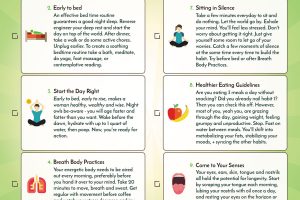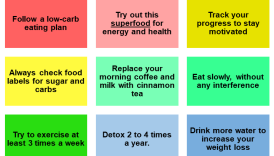10 Essential Habits for a Healthier Lifestyle

Importance of Healthy Living
Healthy living is not just a trend; it’s a lifestyle choice that profoundly impacts well-being. In today’s fast-paced world, people often forget to prioritize their health. However, cultivating healthy habits serves as a foundation for a vibrant life, enhancing physical fitness and emotional stability. For example, when Sarah decided to incorporate regular exercise and nutritious meals into her daily routine, she noticed a boost in her energy levels and an improvement in her mood. This transformation underscores the importance of adopting health-conscious decisions.
- 10 Essential Habits for a Healthier Lifestyle
- Importance of Healthy Living
- Benefits of Developing Good Habits
- Eating Habits
- Balanced Diet
- Portion Control
- Exercise Routine
- Cardiovascular Workouts
- Strength Training
- Hydration Practices
- Water Intake
- Importance of Staying Hydrated
- Sleep Patterns
- Quality Sleep
- Creating a Bedtime Routine
- Stress Management
- Mindfulness Meditation
- Stress-Relief Techniques
- Social Connections
- Building Supportive Relationships
- Importance of Socializing
- Mental Wellness
- Positive Thinking
- Self-care Strategies
- Regular Health Check-ups
- Importance of Preventive Healthcare
- Routine Medical Examinations
- Avoiding Bad Habits
- Smoking Cessation
- Limiting Alcohol Consumption
Benefits of Developing Good Habits
Developing good habits is the cornerstone of healthy living. These habits create a ripple effect that enhances overall quality of life. Here are some benefits to consider:
- Increased Energy Levels: Engaging in regular exercise leads to improved stamina.
- Better Mental Health: Healthy eating and physical activity help reduce stress and anxiety.
- Weight Management: Good habits, like portion control, can lead to sustainable weight loss.
- Longer Lifespan: A commitment to health can contribute to longevity and lower risk of diseases.
Investing in good habits today will yield dividends for a healthier tomorrow.
Eating Habits
Balanced Diet
A balanced diet is crucial for maintaining optimal health and well-being. It involves consuming various foods from all food groups to ensure you get the necessary nutrients. For example, when Mark shifted his eating habits to include more fruits, vegetables, whole grains, and lean proteins, he felt more energetic throughout the day. A well-rounded diet not only supports physical health but also boosts mood and cognitive function. Here are key components of a balanced diet:
- Fruits and Vegetables: Aim for half your plate to be colorful, as they are rich in vitamins and minerals.
- Whole Grains: Opt for brown rice, quinoa, and whole wheat bread for essential fiber.
- Lean Proteins: Include sources like chicken, fish, beans, and nuts, which are vital for muscle repair and growth.
Portion Control
Understanding portion control is equally vital in maintaining a healthy diet. Improper portion sizes can lead to overeating, which may result in weight gain. For instance, when Lucy began using smaller plates, she noticed she was more mindful of her serving sizes and began feeling satisfied with less food. Incorporating these strategies can help manage intake effectively:
- Use Measuring Tools: Use cups or food scales to understand recommended serving sizes.
- Listen to Your Body: Pay attention to hunger cues; eat when you’re hungry and stop when you’re satisfied.
- Mindful Eating: Slow down and appreciate each bite to help reduce the urge to overeat.
By combining a balanced diet with effective portion control, individuals can pave the way for a healthier life.
Exercise Routine
Cardiovascular Workouts
Incorporating cardiovascular workouts into your routine is essential for heart health and weight management. Activities like running, cycling, or swimming can elevate your heart rate and improve stamina. For example, when Jenna started jogging a few times a week, she not only lost weight but also noticed a significant boost in her mood. Here are some effective cardiovascular workouts to consider:
- Running or Jogging: Great for burning calories and improving cardiovascular health.
- Cycling: Whether on a stationary bike or outdoors, it’s fun and low-impact.
- High-Intensity Interval Training (HIIT): Short bursts of intense activity followed by rest, perfect for those with limited time.
Strength Training
Equally important is strength training, which builds muscle and boosts metabolism. When Tim included strength training twice a week, he experienced increased muscle tone and overall strength. It’s important to target all major muscle groups for balanced results. Consider these strength training methods:
- Bodyweight Exercises: Push-ups, squats, and lunges can be performed anywhere.
- Resistance Bands: These are portable and effective for all levels.
- Weightlifting: Using dumbbells or gym machines can enhance muscle growth.
Combining cardiovascular workouts with strength training creates a well-rounded exercise routine that supports long-term health and fitness goals.
Hydration Practices
Water Intake
Maintaining proper hydration is a cornerstone of healthy living, and adequate water intake plays a vital role in overall health. For instance, when Alex began tracking his daily water consumption, he realized he was only drinking half of the recommended amount. After increasing his intake, he noticed a boost in his energy and focus. It’s typically advised to drink around 2 liters (or about 8 cups) of water daily, but individual needs may vary based on activity level and climate. Here are some easy tips to enhance your water intake:
- Carry a Water Bottle: Keep it handy as a reminder to drink frequently.
- Infuse Your Water: Add fruits like lemon or cucumber for added flavor.
- Set Reminders: Use apps or alarms on your phone to prompt you to drink.
Importance of Staying Hydrated
Staying hydrated is essential, as water is crucial for numerous bodily functions. It aids digestion, regulates body temperature, and supports joint health. Lisa found that increasing her hydration improved her skin’s appearance and reduced fatigue. Understanding the importance of hydration can motivate individuals to drink more water. Some benefits include:
- Increased Energy: Proper hydration helps in maintaining high energy levels.
- Improved Concentration: Staying hydrated can enhance focus and cognitive clarity.
- Better Physical Performance: Athletes often notice improved endurance and recovery times.
By prioritizing water intake and understanding its significance, individuals can ensure they remain hydrated, contributing to a healthier and more active lifestyle.
Sleep Patterns
Quality Sleep
Quality sleep is paramount for overall health, impacting everything from mood to cognitive function. Consider how Mark felt sluggish and irritable after a few nights of poor sleep; it wasn’t until he prioritized getting 7-9 hours of quality rest that he regained clarity and energy. Quality sleep ensures your body can repair itself, consolidate memories, and regulate emotions. To improve sleep quality, individuals should focus on creating a comfortable sleep environment:
- Keep the Room Dark and Cool: Darkness signals your body to produce melatonin, promoting sleep.
- Limit Screen Time: Avoid screens at least an hour before bed to minimize blue light exposure.
- Invest in Comfortable Bedding: A good mattress and pillows can make a significant difference.
Creating a Bedtime Routine
Establishing a consistent bedtime routine can greatly enhance sleep quality. When Anna started winding down each evening with a calming routine, she noticed falling asleep faster and waking up refreshed. Consider the following tips for crafting a successful bedtime routine:
- Set a Regular Sleep Schedule: Go to bed and wake up at the same time every day, even on weekends.
- Engage in Relaxation Activities: Reading, meditating, or gentle stretches can signal to your body that it’s time to unwind.
- Limit Caffeine and Heavy Meals: Avoid these in the hours leading up to bedtime to promote better sleep.
By focusing on both the quality of sleep and establishing a nightly routine, individuals can ensure they’re well-rested and ready for the day ahead.
Stress Management
Mindfulness Meditation
Incorporating mindfulness meditation into daily routines can be a game changer in reducing stress. Take Emma; when she began dedicating just ten minutes each morning to mindfulness, she noticed a significant reduction in anxiety throughout her day. Mindfulness teaches us to focus on the present moment, allowing stressors to fade into the background. Here are a few simple ways to practice mindfulness:
- Breathe Deeply: Inhale slowly for a count of four, hold for four, then exhale for four. Repeat this several times.
- Focus on Sensations: As you meditate, concentrate on how your body feels, from the ground beneath your feet to the rising and falling of your chest.
- Guided Meditations: Use apps like Headspace or Calm to help guide your practice with various themes.
Stress-Relief Techniques
In addition to mindfulness, employing various stress-relief techniques can help manage tensions in daily life. For instance, when Jake found himself overwhelmed with work, he tried different approaches, eventually discovering the power of simple stress-relief methods. Consider trying these techniques:
- Physical Activity: Regular exercise, even a brisk walk, releases endorphins, improving mood.
- Journaling: Writing down thoughts and feelings can provide clarity and alleviate emotional burdens.
- Nature Breaks: Spend time outdoors to reconnect with nature, which can significantly reduce stress levels.
By integrating mindfulness meditation and effective stress-relief strategies, individuals can cultivate a more balanced life, enhancing their overall well-being and resilience against daily stressors.
Social Connections
Building Supportive Relationships
Building supportive relationships is a fundamental aspect of a healthy and fulfilling life. When Laura began nurturing her friendships, she noticed a profound impact on her happiness and mental resilience. Supportive relationships provide a safety net during challenging times and help celebrate joyous moments. To foster these connections, consider the following strategies:
- Prioritize Communication: Regular check-ins, whether through calls or texts, can strengthen bonds.
- Be Present: Actively listen and show empathy when interacting with friends, showing them you care.
- Engage in Shared Activities: Participate in hobbies or classes together to bond over shared experiences.
Importance of Socializing
Socializing plays a vital role in mental well-being. When Mark embraced social activities after moving to a new city, he found that connecting with others boosted his mood and reduced feelings of loneliness. Here are some key benefits of socializing:
- Enhanced Emotional Health: Interacting with others helps alleviate stress and promotes feelings of belonging.
- Increased Life Satisfaction: Meaningful connections often lead to greater overall happiness.
- Opportunities for Personal Growth: Engaging with diverse individuals can introduce new ideas and perspectives.
By actively building supportive relationships and emphasizing the importance of socializing, individuals can foster a strong support network that enriches their lives and enhances overall well-being.
Mental Wellness
Positive Thinking
Positive thinking is a powerful tool for enhancing mental wellness. When Sam started focusing on the positives in his daily life, he noticed how it transformed his outlook. Instead of dwelling on setbacks, he practiced gratitude and shifted his mindset to view challenges as opportunities for growth. Here are some tips to cultivate positive thinking:
- Practice Gratitude: Keep a gratitude journal to jot down things you’re thankful for each day.
- Affirmations: Use positive affirmations to reinforce self-esteem and confidence.
- Surround Yourself with Positivity: Engage with upbeat friends and consume uplifting media that inspires you.
Self-care Strategies
In addition to positive thinking, implementing self-care strategies is essential for nurturing mental wellness. Ella found that dedicating time to herself each week significantly improved her mental state. Consider integrating these self-care practices into your routine:
- Regular Breaks: Take time away from responsibilities to recharge, whether it’s a quiet moment with a book or leisurely walk.
- Healthy Hobbies: Engage in activities you love, such as painting or gardening, to boost mood and creativity.
- Mindfulness Practices: Incorporate meditation or deep breathing exercises to center yourself and manage stress.
By adopting positive thinking and committing to regular self-care, individuals can create a robust foundation for their mental wellness, paving the way for a more fulfilling life.
Regular Health Check-ups
Importance of Preventive Healthcare
Regular health check-ups play a crucial role in preventive healthcare, enabling individuals to catch potential health issues before they escalate. When John began scheduling annual check-ups, he discovered that early detection of high blood pressure allowed him to make necessary lifestyle changes, ultimately preventing more serious complications. Preventive healthcare not only saves lives but also reduces healthcare costs in the long run. Consider these key reasons for prioritizing preventive care:
- Early Detection: Identifying health issues early increases the chances of successful treatment.
- Health Education: Regular check-ups offer opportunities to learn about healthy lifestyle choices.
- Building a Health History: Establishing a relationship with your healthcare provider creates a valuable health history, making future assessments easier.
Routine Medical Examinations
Routine medical examinations are essential in maintaining overall health. When Lisa committed to regular screenings, she was able to monitor her cholesterol levels and maintain a healthy lifestyle. Some important routine examinations to consider include:
- Blood Pressure Checks: Regular checks can help manage and prevent hypertension.
- Blood Tests: These can assess cholesterol, blood sugar levels, and other vital indicators.
- Cancer Screenings: Procedures such as mammograms and colonoscopies can save lives through early detection.
Incorporating regular health check-ups and understanding the importance of preventive healthcare ensures individuals can maintain their well-being and lead healthier, more vibrant lives.
Avoiding Bad Habits
Smoking Cessation
Avoiding bad habits is vital for maintaining good health, and smoking cessation is one of the most impactful changes one can make. When Sarah decided to quit smoking after ten years, her journey was challenging but immensely rewarding. She found that day by day, she felt physically better and regained control over her health. Here are effective strategies for smoking cessation:
- Set a Quit Date: Choose a specific day to quit and prepare mentally for that change.
- Seek Support: Engage with friends or support groups who can encourage and motivate you.
- Consider Nicotine Replacement: Options like patches or gum can help manage withdrawal symptoms.
Limiting Alcohol Consumption
In addition to quitting smoking, limiting alcohol consumption enhances overall health and well-being. When Mike reduced his drinking, he noticed improved sleep and more energy during the day. To manage alcohol intake, consider these helpful tips:
- Set Limits: Decide ahead of time how many drinks you’ll have and stick to it.
- Choose Alcohol-Free Days: Dedicate certain days each week to abstain from alcohol completely.
- Stay Hydrated: Drink water between alcoholic beverages to pace yourself.
By focusing on smoking cessation and responsibly managing alcohol consumption, individuals can significantly improve their health, leading to a happier and more active lifestyle.




